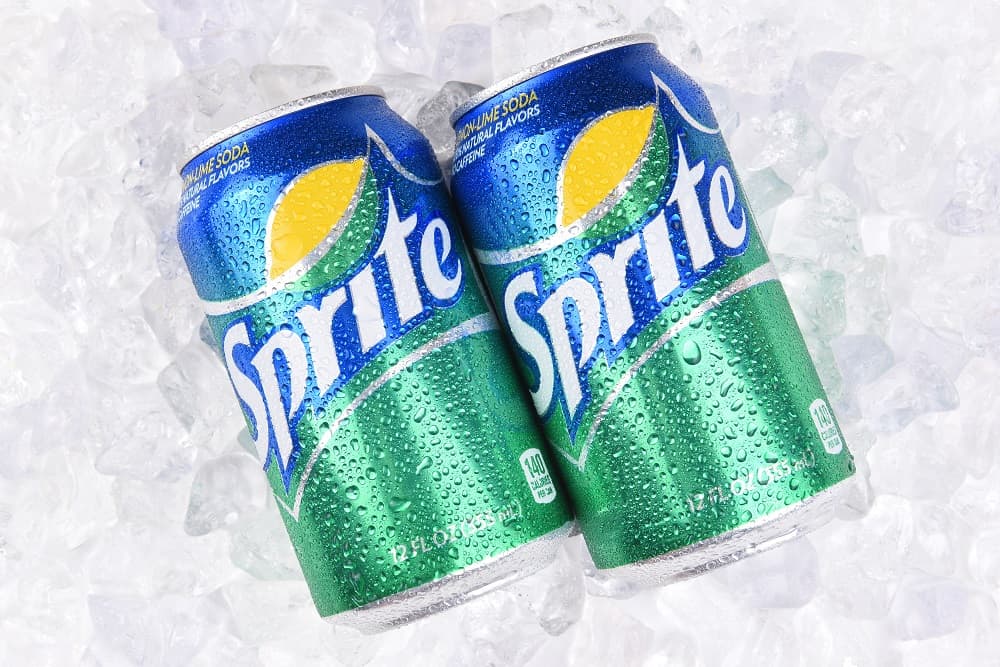With the slogan, “obey your thirst,” Sprite has captivated the lemon-lime flavored market in the US as early as 1961. Developed by the Coca-Cola company to compete with PepsiCo’s 7 Up, Sprite began to attract a large following in the 1980s. Since then, the company has always directed its Sprite marketing towards teenagers with current pop culture references and iconography (e.g., hip-hop, graffiti, sports, adventure, etc.).
Based on its current ingredient list, Sprite is considered to be vegan as it does not contain any obvious animal products or by-products. However, there are certain flavors that contain ingredients that some vegans might be uncomfortable with such as natural flavors, yellow 5, sugar, and glycerol ester of rosin.
Table of Contents
Is Sprite Vegan?

According to dietary vegans, Sprite is completely vegan because it does not contain any animal products.
Furthermore, the Coca-Cola company itself claims that most of their products are suitable for vegetarians and vegans except for a few drinks that contain fish gelatin, honey (e.g., Schweppes Indian Tonic Water and Honest Lemon and Honey), or milk (e.g., Costa Coffee Ready-to-Drink Caramel Latte and Costa Coffee Ready-to-Drink Latte, Costa Coffee Ready-to-Drink Americano) (1).
Sprite Ingredient List
The list of ingredients of Sprite includes (2): carbonated water, high fructose corn syrup, citric acid, natural flavors, sodium citrate, and sodium benzoate.
However, it should be noted that the ingredients listed above are for the original Sprite. There are slight variations depending on where the beverages were manufactured.
For example, Sprite made in the UK has an ingredient list that includes: Carbonated water, sugar, citric acid, sweeteners (acesulfame K and aspartame), acidity regulator (sodium citrate), and natural lemon and lime flavorings.
Based on these ingredients, Sprite is technically considered vegan. This is because none of the ingredients listed are sourced from animal products. However, Sprite contains natural flavors which raises some concern for some vegans.
Furthermore, Sprite is available in a number of flavors that also contain questionable ingredients. Most flavors such as Sprite Cherry, Sprite Ginger, Sprite Tropical Mix, and Sprite Winter Spiced Cranberry have relatively similar ingredient lists as the original, suggesting that natural flavors play a critical role. However, Sprite Lymonade contains glycerol ester of rosin and yellow 5 – both ingredients are cause for concern for vegans.
Thus, the following ingredients contained in the Sprite lineup are of concern: natural flavors, glycerol ester of rosin, and yellow 5.
Natural Flavors
Natural flavors are one of the most common ingredients people can find in a wide selection of products due to their vague and widely encompassing definition. However, it is the very fact that its FDA definition is so vague which is why vegans tend to avoid products with natural flavors.
According to the FDA, natural flavors are defined as:
“The essential oil, oleoresin, essence or extractive, protein hydrolysate, distillate, or any product of roasting, heating or enzymolysis, which contains the flavoring constituents derived from a spice, fruit or fruit juice, vegetable or vegetable juice, edible yeast, herb, bark, bud, root, leaf or similar plant material, meat, seafood, poultry, eggs, dairy products, or fermentation products thereof, whose significant function in food is flavoring rather than nutritional (3).”
FDA.gov
This means that unless the company puts a label declaring their products to be vegan, or if an individual directly asks the company, then there is no way of knowing whether the ingredient listed as "natural flavors" is vegan or not.
Food Coloring Agents
While most Sprite flavors don’t have food coloring agents, one does – Sprite Lymonade. Specifically, the flavor uses Yellow 5, also known as tartrazine. This type of food coloring agent is synthetically made which means that it does not use animal products or by-products in its production.
However, food coloring agents are still a big issue with the vegan community. This is because synthetic dyes typically undergo animal testing. Ethical vegans avoid products that undergo animal testing in efforts to protest against animal cruelty.
Yellow 5 has been tested on a wide selection of animals including mice, rats, cats, dogs, fish, and birds (4).
Glycerol Ester of Rosin
Another common ingredient that poses a concern to the vegan community is glycerol ester of rosin, also known as glycerol ester of wood resin or ester gum.
Companies add glycerol ester of rosin to their products as an oil-soluble additive that helps keep oils in suspension in water.
To understand why glycerol ester of rosin is problematic to vegans, its production should be discussed. Glycerol ester of rosin is essentially made of two things: wood resin and glycerin.
As a raw material, wood resin is vegan because it is a material that is obtained from longleaf pines (Pinus palustris) and slash pines (Pinus elliottii).
In contrast, sources of glycerin are more varied. As a polyol compound, glycerin can be obtained from both vegetable oil and animal fat. Unfortunately, ingredient lists seldomly declare their glycerin sources. This means that unless it is properly declared, or an individual asks the company, then there is no way of knowing whether the glycerin used was obtained from vegan sources.
Sugar
Chemically referred to as sucrose, sugar is a common ingredient that many vegans avoid. Technically, sugar is sourced from sugar cane or sugar beets which makes sugar vegan. Unfortunately, the sugar industry processes/refines the sugar in a way that can make it non-vegan.
A common process in the sugar industry is to refine and decolorize sugar, in order for sugar to be marketed the way people want it – fine and white. This refinement process involves a filtering phase wherein sugar companies typically use bone char – the charred bones of various animals.
There are vegan ways of preparing sugar, but usually, the only way to know whether the sugar being used vegan is to ask the company directly.
One thing to note that while sugar is used for the UK version of Sprite, the use of bone char in the sugar industry is more prevalent in the US. However, this can only be confirmed by asking the company directly.
References
1. https://www.coca-cola.co.uk/




